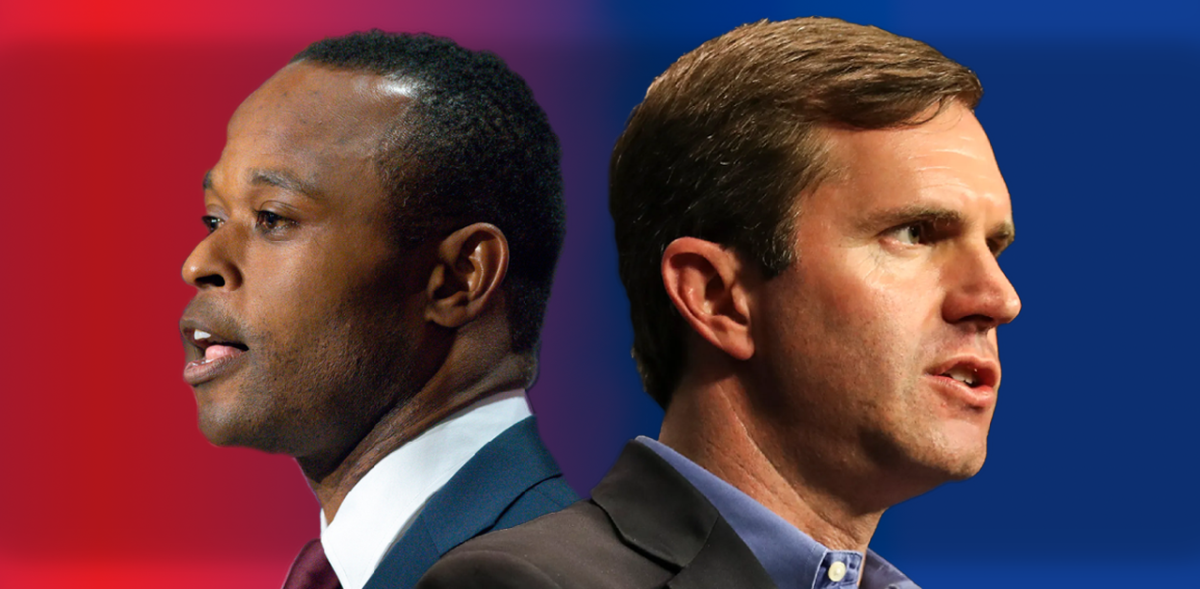On November 7, Kentucky voters will return to the polls to vote for their next governor. The Democratic incumbent Governor Andy Beshear is making a bid for reelection, challenged by Republican Attorney General Daniel Cameron. The candidates’ campaigns have been bitter struggles; despite the fact that Cameron has never polled higher than Beshear, the race is predicted by analysts to be a close, pivotal election for the direction of Kentucky. Here’s what you need to know.
This election cycle was markedly contentious. Both candidates and their aligned groups have spent a combined total of over $59 million on their election bids, which is more than double the amount spent in the last election. Over the course of his campaign, Cameron has brought the culture wars of national politics to the forefront, attacking Beshear on wide-ranging issues from abortion to crime. The attorney general has often compared Beshear to President Joe Biden, in an attempt to link national economic and social issues directly to Beshear’s leadership.
“On the things that really matter, Beshear and Biden are one and the same,” said a recent pro-Cameron campaign ad released by the Republican Governors Association. The same ad accuses Beshear of “coddling criminals” and “destroying Kentucky jobs”.
“I suspect that you are concerned about inflation destroying your wallet, the far left indoctrinating your kids and Joe Biden’s war on coal,” said Cameron, addressing the crowd at an October 16 debate with Beshear. His statements exemplify the nationwide hot-button issues and the cultural division from which Cameron has forged his platform.
Conversely, Beshear has, for the most part, focused his campaign on local issues. He has often made the case that the economic benefits he has offered to Kentucky justify a second term.
“I’ve worked in Kentucky most of my life, and there’s more jobs here now than I’ve ever seen,” said a small business owner in a recent pro-Beshear campaign ad. “Beshear has been great for business.”
“We are on a winning streak the likes of which we’ve never seen,” said Beshear at the October 16 debate. “We brought in a record 27.5 billion dollars of new investment, and we have the lowest unemployment rate ever seen in Kentucky.”
Under Beshear’s leadership, Ford has made a $6 billion dollar investment in two electric vehicle battery plants in Hardin County, which are expected to create at least 5,000 jobs. The governor has touted this as a “planetary-size investment” that will “launch a new era of sustainable manufacturing.”
After leading the state through the COVID-19 pandemic, Beshear oversaw the recovery of the state’s economy. In Aug. 2023, 20,000 fewer people were employed in Kentucky compared to immediately before the shutdown. In the wake of the pandemic, the governor has pushed to expand Medicaid to cover dental, vision and hearing care. His position contrasts with Cameron’s plan to lessen government spending by restricting Medicaid access. The attorney general has stated that as governor, he would disqualify able-bodied Kentuckians from receiving Medicaid coverage unless they are actively employed.
Another area in which the two candidates especially differ is the topic of abortion, where both candidates have accused one another of extremism in their beliefs. After the U.S. Supreme Court overturned Roe V. Wade in 2022, the national right to abortion was abolished, leaving each state to determine the legality of abortion within their own borders. As a result, the Kentucky legislature passed a bill outlawing all instances of abortion, except in cases that directly threaten the life of the mother. Governor Beshear vetoed the aforementioned bill, and that veto was overridden by the state legislature. Beshear has made it clear that he stands behind the right to have an abortion.
“Kentucky’s trigger law is one of the most extreme laws in the country. It provides no exceptions for survivors of rape and incest or women with nonviable pregnancies,” said Beshear. “In just the two years before the Dobbs decision, there were two nine-year-old’s and 34 girls under the age of 15 who needed these options — my opponent would give them none.”
On the campaign trail, Beshear has often called out Cameron for altering his position on the issue, claiming Cameron is changing his stance depending on his polling results. As attorney general, Cameron has defended the no-exceptions law in court on several occasions, and signed his name on a survey by the Kentucky Right to Life foundation where he pledged to oppose any exceptions to the abortion ban.
Yet, Cameron has also claimed that if the state legislature were to offer him a bill featuring exceptions, he would sign it as governor. This is despite the fact that the solidly right-leaning Kentucky legislature is incredibly unlikely to do so, having already shown that at least two thirds of its lawmakers support zero exceptions– enough to override Governor Beshear’s veto.
“…If the courts were to strike down the law and say that we needed to add exceptions, of course I would sign that because I still want to protect life. But that would just be based on if our courts made that change; it wouldn’t be me, proactively,” said Cameron, summarizing his shifting viewpoints in September.
Neither Beshear’s campaign nor Cameron’s campaign responded to a request for comment.
As many Manual students head to the polls for the first time ever, they will cast a vote in one of the most bitterly divisive elections that Kentucky has ever seen. With two diverging candidates who offer opposing stances on how to shape the state into the future, this election will not only reveal Kentucky voter opinions, but could offer insight into how voters feel about the state of the country leading up to the 2024 election.
“I think this race is about crazy versus normal,” said Cameron. “I think it’s crazy to have a governor who openly endorses Joe Biden.”
“When you’re on a historic winning streak, you don’t fire the coach,” said Beshear. “You don’t sub out the quarterback. You keep your team on the field.”








